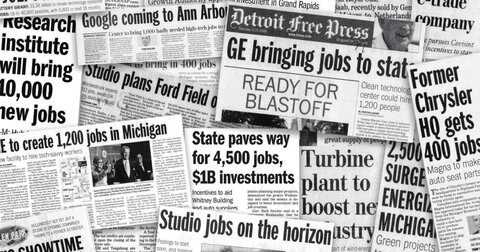Report: Michigan should subsidize electric vehicles from cradle to grave
Trade associations, nonprofits, expect 2 million EVs by 2030, up from 47,000 currently registered
A new report suggests Michigan enact policies to narrow the gap between this year's 46,700 registered electric vehicles and the state's goal of having 2 million registered by 2030.
The 150-page report recommends that taxpayers subsidize electric vehicles from cradle to grave, subsidizing the initial purchase, charging stations and EV maintenance programs.
A coalition of trade associations and nonprofit educational organizations collaborated on the report: Clean Fuels Michigan, The Institute for Energy Innovation, The Michigan Clean Fuels Institute and the Michigan Energy Innovation Business Council.
The report calls on various state agencies to plan for 2 million electric vehicles or 100,000 chargers in Michigan by 2030. These agencies include the Department of Technology, Management, and Budget; Environment, Great Lakes, and Energy; Department of Licensing and Regulatory Affairs; Department of Labor and Economic Opportunity; Department of Transportation; and Michigan Public Service Commission.
Earlier this year, 46,700 EVs were registered statewide. That’s about 2.3% of the 2030 goal of 2 million electric vehicles. Michigan has 6.3 million traditional gas vehicles registered, along with 327,100 diesel vehicles.
The report recommends Michigan enact a clean-fuel standard that would phase out the use of most vehicles with internal combustion engines. The change would cost the typical Michigan household an additional $350 in fuel costs annually, according to a study from the Mackinac Center for Public Policy.
Backers of the report say the expense is justified. “Building out a sufficient public EV charging (network) is going to be costly, and establishing a (clean-fuel standard) program in Michigan is one of the most promising opportunities to support transportation electrification,” the report said.
The report did not examine the potential taxpayer cost to enact these priorities. It did, though, cite an analysis that said enacting a clean fuel standard would benefit electricity producers and charging providers by more than $500 million annually, on average.
The report suggests that government agencies force all new homes and buildings to be built with either Level 2 chargers or direct current fast-charging units for electric vehicles. It also advocates replacing roughly 14,000 state-used vehicles with electric vehicles and subsidizing the purchase of new and used EVs for public and private fleets as well as for moderate and low-income buyers.
Michigan’s environmental agency awarded a sponsorship grant to the Michigan Energy Innovation Business Council in fiscal year 2024 to cover engagement for the report, Jeff Johnston, EGLE’s public information officer, told Michigan Capitol Confidential in an email.
The report recommends that taxpayers subsidize EV chargers in disadvantaged communities, rural areas and in areas with multi-family housing. The biggest barriers to EV adoption are higher cost compared to standard vehicles, range anxiety and a sparse charging network, according to S&P Mobility, Science Direct and Kelly Blue Book.
The report's recommendations would force taxpayers to enrich green energy groups, Rep. Pat Outman, R-Six Lakes, a member of the House Energy Committee, told CapCon in an email. The report was like “asking a kid to write a Christmas list for Santa,” according to Outman.
“As a rural Michigan representative, I don’t see a lot of need for EV charging in our areas, but if there ever is a demand for it, then the free market will drive private businesses to bring them in,” Outman wrote. “The same goes for mandating that new homes be built with EV charging capability. If enough home buyers want them, then builders will begin to install them on their own. There’s no reason for the government to force anything.”
The groups are trying to manipulate public policy to increase profits, said Jason Hayes, director of energy and environmental policy at the Mackinac Center for Public Policy.
“Of course, they cloak their actions in soothing terms like ‘energy conservation’ and ‘maximizing customer benefits.’ But the reality is that customers aren’t asking for the policies proposed in the ‘Transportation Electrification in Michigan’ report,” Hayes told CapCon. “In fact, growth in electric vehicle sales is trailing off rapidly as customers learn more about their environmental impacts and face challenges like ‘range anxiety.’ The electrification policies promoted in this report will ladle further mandates and restrictions on customer choice while lavishing more protections and corporate welfare on select businesses and special interests.”
Michigan Capitol Confidential is the news source produced by the Mackinac Center for Public Policy. Michigan Capitol Confidential reports with a free-market news perspective.


 State climate conference to tout clean energy plans that will raise electricity costs
State climate conference to tout clean energy plans that will raise electricity costs
 Michigan State Police lease first EV at $1,062 per month
Michigan State Police lease first EV at $1,062 per month
 Michigan firefighters dumped 3,000 gallons of water on burning Tesla
Michigan firefighters dumped 3,000 gallons of water on burning Tesla

 SOAR program promised 8,812 jobs, delivered none
SOAR program promised 8,812 jobs, delivered none
 Michigan’s auto industry boondoggle: billions in subsidies, 287,000 jobs lost
Michigan’s auto industry boondoggle: billions in subsidies, 287,000 jobs lost
 Consumers Energy requests another rate hike one week after approval of $154 million increase
Consumers Energy requests another rate hike one week after approval of $154 million increase